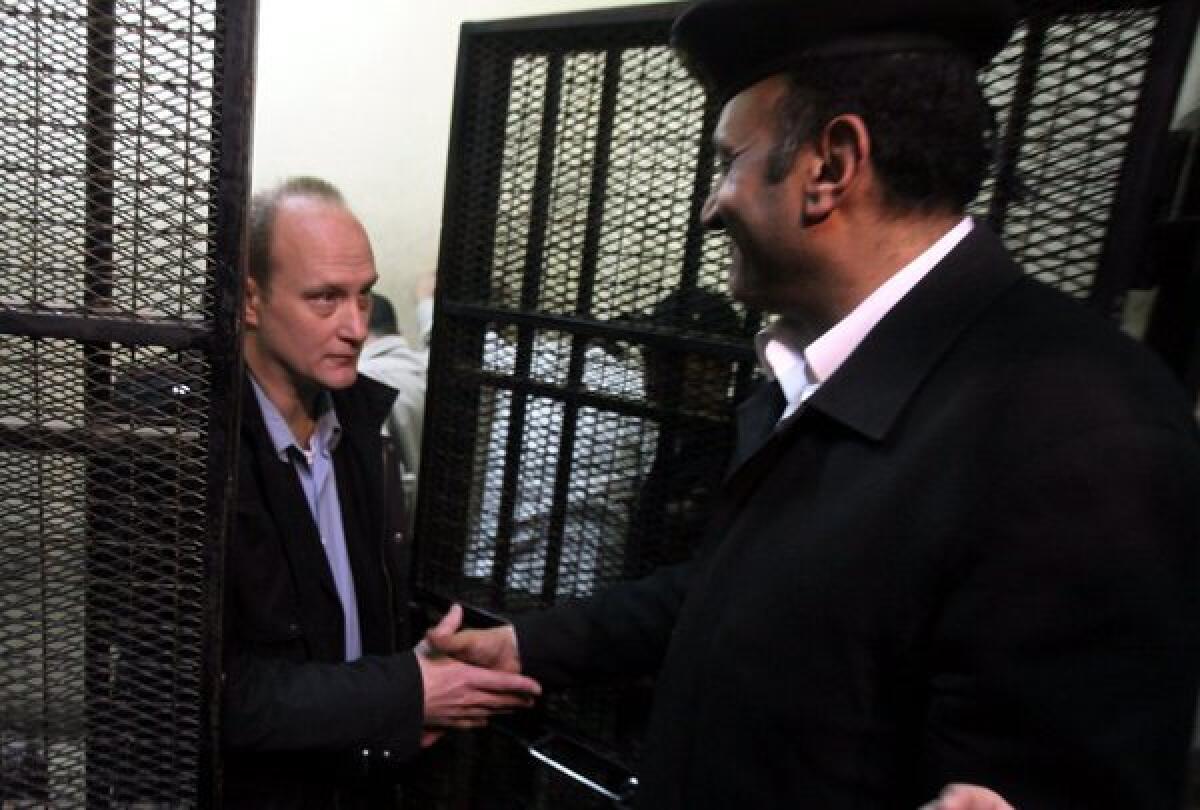Egypt court sentences American pro-democracy workers to prison

CAIRO -- In a diplomatic drama that has strained relations between the United States and Egypt, a Cairo criminal court Tuesday sentenced at least 16 Americans to prison on charges of operating illegally funded pro-democracy organizations.
Many of the Americans, most of whom fled the country last year, were sentenced in absentia to five years in prison on accusations of agitating unrest. The only American to appear in the Cairo courtroom -- Robert Becker -- was reportedly handed a two-year jail term. It was not immediately known if he was released pending an appeal.
The case escalated into a political crisis between Washington and Cairo during the tense months following the 2011 uprising that toppled autocrat Hosni Mubarak. Tuesday’s verdict is likely to further anger the U.S., which has urged President Mohamed Morsi, an Islamist, to expand civil freedoms at a time when his government is clamping down on critics.
International pro-democracy workers have long been viewed with suspicion in Egypt as spies or pesky infiltrators. Most of the Americans sentenced Tuesday belonged to Freedom House, the International Republican Institute and the National Democratic Institute. The nongovernmental organizations had been working on educational programs ahead of Egypt’s elections when their offices were raided in late 2011.
The Americans, including Sam LaHood, son of U.S. Transportation Secretary Ray LaHood, were among 43 defendants. Others charged were from Egypt, Serbia, Norway, Germany and several Arab states. Many of the Americans left the country in early 2012 after Egypt temporarily lifted a travel ban amid mounting pressure from Washington.
Judge Makram Awad on Tuesday also ordered the closing of the U.S.-based NGOs and other civil society groups. The decision comes amid increasing criticism by human rights groups against a proposed law by the Morsi government to tighten restrictions on nongovernmental organizations.
“This draft law dashes all hopes that independent groups could operate freely and independently after the revolution,” Human Rights Watch said in a recent statement. “Egypt’s proposed NGO law would allow the government free rein to cut off funding and halt activities of groups that it finds inconvenient. It is hostile to the very notion of independent civil society.”
The trial against the Americans began in 2012 when the Egyptian military ruled the country after the fall of Mubarak. The case, which tapped into growing anti-American sentiment, was regarded by many government critics as a move by Egypt to deflect attention from months of economic and political turmoil.
Congress responded by threatening to cut off more than $1.3 billion in annual U.S. aid to the Egyptian military.
In an interview with the Los Angeles Times last year, Becker, who worked for the National Democratic Institute, said he decided to remain in Cairo as a show of solidarity with his Egyptian codefendants.
“Call it moral grounds or stubbornness,” said Becker. “I never contemplated leaving this country if [criminal] charges were hanging over the Egyptian staff working for me. I wasn’t interested in hiding behind the color of my passport.”
ALSO:
Syrian rebel stronghold pounded by government shelling
U.S. concerned about reports of excessive force in Turkey
Kerry presses peace deal at American Jewish Committee meeting
More to Read
Sign up for Essential California
The most important California stories and recommendations in your inbox every morning.
You may occasionally receive promotional content from the Los Angeles Times.











